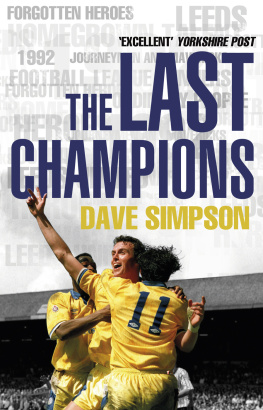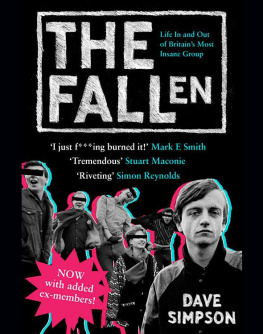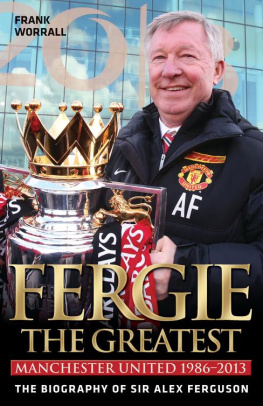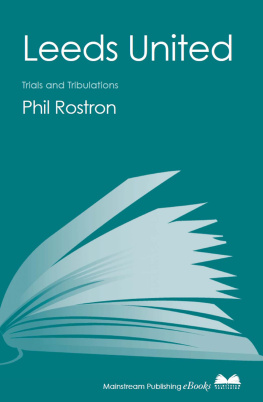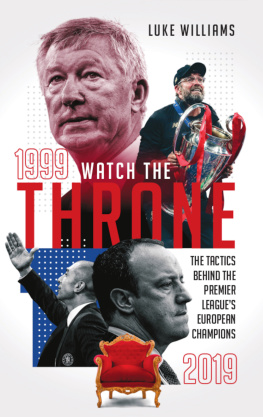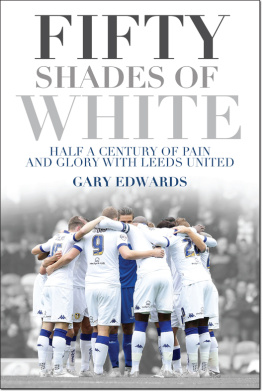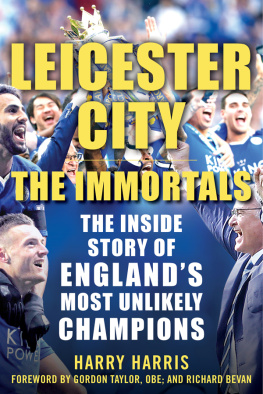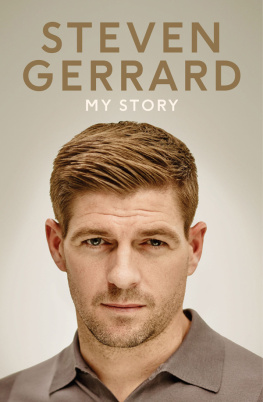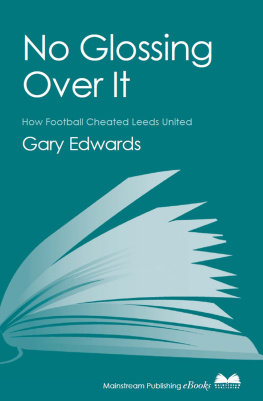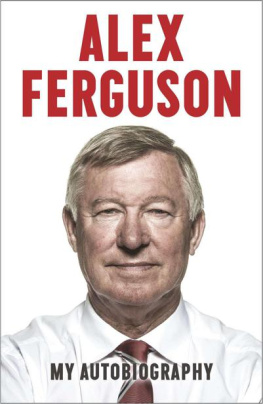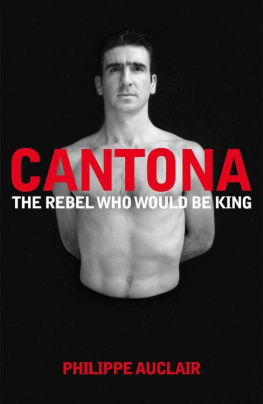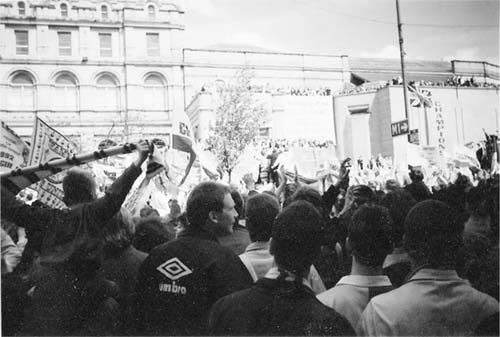THE LAST CHAMPIONS
Dave Simpson
TRANSWORLD PUBLISHERS
6163 Uxbridge Road, London W5 5SA
A Random House Group Company
www.transworldbooks.co.uk
First published in Great Britain
in 2012 by Bantam Press
an imprint of Transworld Publishers
Copyright Dave Simpson 2012
All images courtesy of the author unless otherwise stated. Pages 12, 30 70, 122, 148, 172, 232, 244, 268, 282, 304 and 312 Press Association Images. Pages 118 Adrian Dennis/Rex Features. Page 296 Jonathan Hordle/Rex Features.
(The page references correspond to the printed edition from which this ebook was created.)
Dave Simpson has asserted his right under the Copyright, Designs and Patents Act 1988 to be identified as the author of this work.
A CIP catalogue record for this book is available from the British Library.
Version 1.0 Epub ISBN 9781446488119
ISBN 8780593069264
This ebook is copyright material and must not be copied, reproduced, transferred, distributed, leased, licensed or publicly performed or used in any way except as specifically permitted in writing by the publishers, as allowed under the terms and conditions under which it was purchased or as strictly permitted by applicable copyright law. Any unauthorized distribution or use of this text may be a direct infringement of the authors and publishers rights and those responsible may be liable in law accordingly.
Addresses for Random House Group Ltd companies outside the UK can be found at:
www.randomhouse.co.uk
The Random House Group Ltd Reg. No. 954009
2 4 6 8 10 9 7 5 3 1
To the memory of Gary Andrew Speed, 19692011
Where does the power come from, to see the race to its end? From within.
Chariots of Fire
Contents
English First Division, 1991/92
Prologue
It was a Monday morning in July, and I was ringing a Sheffield branch of a popular travel agency.
Hello, I began. Can I speak to Mr Shutt?
Im afraid the assistant manager isnt available at the moment, replied the female voice at the end of the line. Can I help? Are you looking to book a holiday?
I wasnt looking to book a holiday, but I couldnt admit, Im looking for Shutty! Who won the last ever First Division title with Leeds United! The tireless South Yorkshireman who ran his bloody legs off and scored one of the greatest goals in the history of the club when he came on against Stuttgart in the European Cup and ran the full length of the pitch to put it past the keeper with his first touches of the game!
Id first begun my quest to meet Carl Shutt by skulking around the shop, hoping to bump into him; now Id started ringing them up, which meant Id gone from being a weirdo stalker to a telephone pest. Why was I doing this?
It started a few weeks earlier, in May, when Id been sat at Leeds Uniteds Elland Road ground watching my beloved team limp towards another false dawn. Leeds had yet again managed to miss out on promotion to English footballs top flight, where as one of the best-supported clubs in England, if not the world they surely belonged. As another season bulging with promise had fizzled out like a damp firework, Id found my thoughts drifting to a similar spring day almost two decades earlier, when a Leeds United team assembled by manager Howard Wilkinson had stood as proud champions at the summit of domestic football.
I remembered the glorious day when the title was won, Sunday, 26 April 1992, when Leeds were 32 victors in a bizarre, windy, fluke-ridden noon kick-off game at Sheffield United while Man U went down at Liverpool that afternoon, continuing Englands biggest clubs quarter-century wait to win the league. Manager Howard Wilkinson dubbed Sergeant Wilko by fans and players for his dour military air and inscrutable, almost unknowable persona, which seemed to shroud a bone-dry humour was then doorstepped by the media during his Sunday dinner, and had been so atypically overcome by emotion or something stronger that he could barely manage a word.
In three and a half astonishing seasons, the former schoolteacher from South Yorkshire had taken the ailing West Yorkshire giant from the bottom of the old Second Division to the top of the First, the speed of the ascent even outstripping the achievement of the legendary Leeds United manager Don Revie, whod taken eight years to accomplish the same thing in the 1960s.
The triumph was all the more remarkable because forty-eight-year-old Wilko, then seen as the most brilliant manager in English football, had beaten Sir Alex Fergusons more lavishly funded Manchester United to domestic footballs top honour with players often picked up on the cheap. Some of Wilkos troops the likes of Scottish internationals Gordon Strachan and Gary McAllister were top players (Strachan had in fact been snapped up for a modest fee after being surplus to requirements at none other than Manchester United). But many players followed Wilko from Sheffield Wednesday, or had been signed from lowly clubs; he had even taken two players from non-league football and turned them into League Championship medal winners, which would be unthinkable, if not impossible, now.
Those Leeds United players werent just champions but the Last Champions, the final winners of the Football League before the formation of the Premiership brought wall-to-wall Sky TV, all-seater stadiums, fancy foreign players, multi-million-pound transfer deals and wages, and billionaire owners. Wilkinson remains the last English manager to win the league, with players who for the most part werent paid that much more than the people in the stands. It was the last title won by ordinary people, and the end of an era.
From almost the moment Wilkinson held up the trophy, English football was in revolution. From then on, battles for the title would be as much about contests between financial muscle as management or tactics. Things would never be the same again.
Looking back on it all that day in May 2011, it felt like some distant, almost mythical era of muddy pitches, cheap tickets and players you could bump into in the city centre. I recalled the amazing citywide celebrations even before the following weeks game at home against Norwich City, the last league fixture of the season. On the way up to Elland Road, four of us had crammed into a tiny car, our pal Tim hanging out of the window shouting Campioni! Campioni! at passers-by amid a cacophony of car horns.
The game itself, which Leeds began as champions and won 10, was surreal, like a practice match; even the Norwich players seemed in awe of the occasion, or the achievement, or the fact that a giant stuffed panda was partying with the players on the pitch. I particularly remembered the post-match title celebrations, when everybody, including the mayor, turned out to honour the manager and his triumphant players, who stood on a balcony outside the Town Hall as mercurial French centre-forward Eric Cantona uttered his comically worded but instantly memorable Why I love you, I dont know, but I love you pronouncement to thousands of cheering supporters. Back then, it felt like the entire population of Leeds had turned the city into a beautiful display of white, yellow and blue.
For the players, it was the defining moment of their lives. For me, a typical supporter, it was the culmination of almost twenty years supporting the club and the proudest, most exhilarating moment Id ever known in football.
But now Leeds United were back where they were before Wilkinson came to the club, struggling in the second tier with falling crowds, and it was starting to feel like 1991/92 was a mirage, some distant, almost-forgotten dream that may or may not have happened.
Next page
